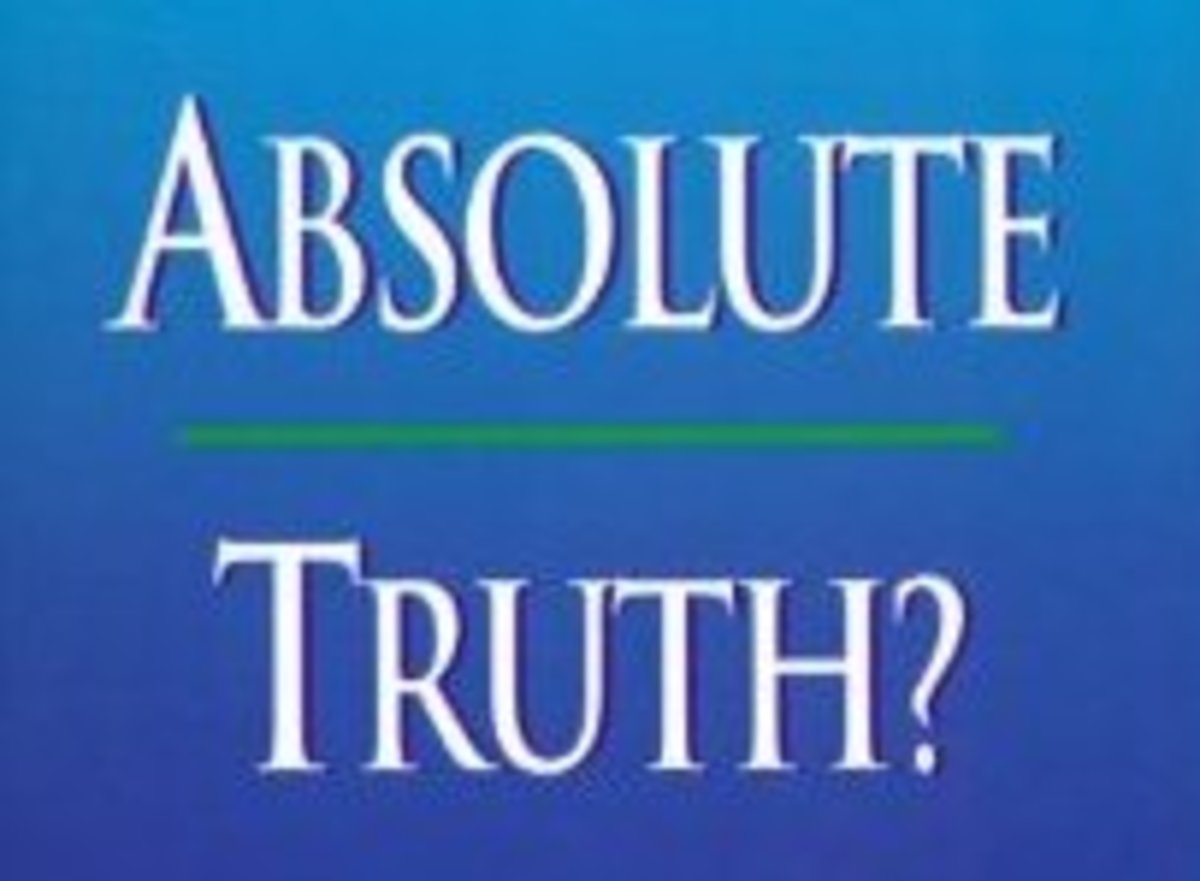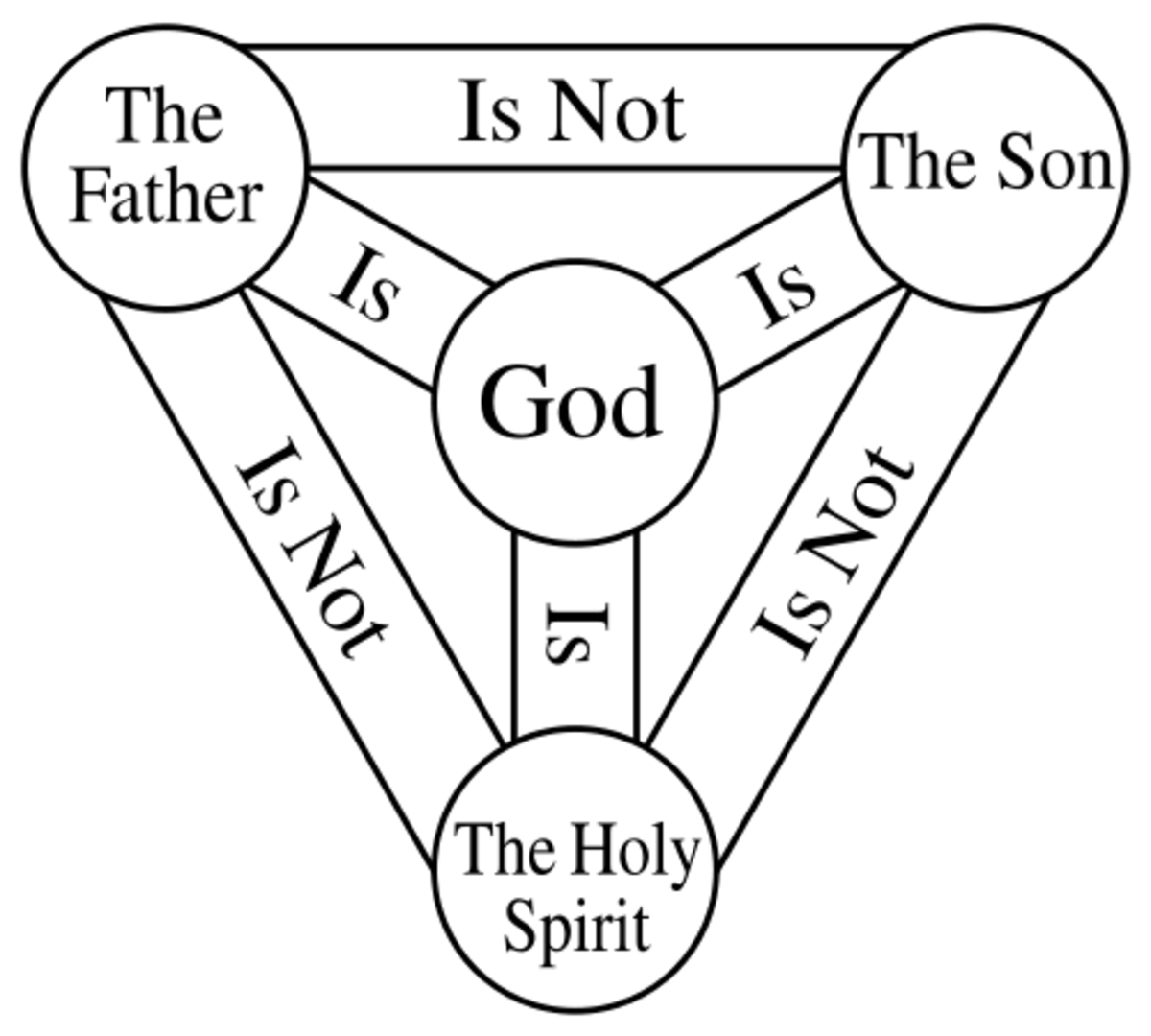Philosophy Essay on Truth, Goodness, and Beauty, Part II: Is There an Absolute Good?

You may be interested in....
- What is TRUTH?
Part I of my series: "The True, the Good, and the Beautiful" - The Beauty of Holiness
Part III of my series: "The True, the Good, and the Beautiful"
The principle that God holds in Himself all truth must also require that God holds in Himself all the truth about Goodness, for if there is such a thing as absolute goodness, then this falls under the category of absolute truth. The truth about what is right and wrong, good and bad, is beneficial for humanity to understand, for it is by knowing this truth that our lives can be governed.
Finding the Good
During Jesus’ ministry, a young and rich ruler came to Him with a weighty question: “Good Teacher, what good thing shall I do that I may have eternal life?” (Matthew 19:16) The young ruler was asking for the truth about goodness. First, he assumed that Jesus was good, and second, that man must do a good thing to have eternal life.
Just as mankind is asking Pilate’s question, “What is truth?” man is also asking the rich young ruler’s question: “What good thing must I do?” However, most men are not so far ahead in their understanding of goodness as the rich young ruler was. Most men do not understand that God is the author of all good, nor that there is even a standard of absolute good.
Goodness is a difficult idea to grasp, for it has often been associated with that which fills a need or desire ("that was a 'good' meal"), it represents moral purity and charity to fellow men ("my father is a 'good' man"), and it carries connotations of absolute moral purity.
Modernism: Goodness is a Fulfillment of a Need or Desire
We say it is good to have a need filled. It is good to be fed when hungry, loved when lonely, sheltered and clothed when vulnerable. Anything that meets these needs is “good.” Food is good, love is good, and shelter and clothing are all good when they are needed.
But the hitch comes when we realize that “goodness” is not inherent in the nature of everything that is needed. Goodness is not inherent in the nature of food. Food is a good thing and brings a good event when it meets the need of hunger, but food is not always good, everywhere, in every situation. Too much food in the wrong place and at the wrong time can cause bloating or discomfort. Can too much of a good thing cancel its nature of goodness? Yet we know there must be an absolute Good that is always Good.
We must also question desires. Is having a desire fulfilled always good? If our desires are good, the object that fulfills them must be a “good” thing. But is it then “bad” when our “good” desires are not fulfilled? Are our good desires always needs, or do there exist good things outside of what is needed? Do we ever desire an evil thing to the point that we believe it is a need, and will fulfill that desire until it leads to excessiveness or addiction to something detrimental to our well-being?
Mortimer Adler, a modernist who often comes close to the truth but misses it by a hair, solves this dilemma by discerning between “natural desires” that every human being has which he claims will be always be fulfilled by a genuinely Good thing; and subjective desires, which vary from person to person:
On the one hand, there are desires inherent in our human nature, rooted in potentialities or capacities that drive or tend toward fulfillment. These are our natural desires, desires with which we are innately endowed…they are present in all human beings…(they always tend toward or seek fulfillment). On the other hand, there are the desires that each individual acquires in the course of his or her life, each as the result of his or her own individual experience, conditioned by his or her individual temperament and by the circumstances of his or her individual life. (Six Ideas That Rule the World)
Adler may be on track as far as subjective desires go. Not all men think blue is a “good” color to paint their home, and lemons may bring more pleasure to someone who values them than to someone who doesn’t. But we are not concerned about subjective preferences, except when they cross over the line and enter into the area of objective Good. In this area we must be careful, for more and more of the absolute Good is being sacrificed to the subjective good. Truth, too, has fallen prey to this as we saw in the earlier article (http://hubpages.com/hub/The-True--the-Good--the-Beautiful-Part-I) which addressed the postmodernist viewpoint that all truth (and goodness) is subjective to each individual’s tastes.
Adler’s view is that absolute Goodness, for all men, is found in when the “good” thing meets a real need, inherent in the laws of human nature. Though this has a shade of Biblical truth (all men need God, God is Good), Adler’s next point of logic is dangerous: “It is by reference to our common human needs that we claim to know what is really good for all human beings.”

Four Reasons Why Adler's Definition Doesn't Work
1. Too much of a good thing causes it to stop being a good thing. Food fulfills the body’s need for energy, and no one would dispute that food is a true need for all human beings (to survive), not just a desire. Adler’s method for discerning the ultimate Good is that something Good always fulfills a real need. However, we have seen before that too much food becomes a Bad thing. This same principle can go for other genuinely “needed” things that are not intrinsically Good when they surpass fulfilling the need and start fulfilling a mere desire, such as sleep, money, or possessions.
2. It is difficult to know if a need is valid and if it will really be fulfilled by what we think it needs. To understand first if a need has actually been completely fulfilled by a good thing, then we must have an infinite knowledge of the future consequences that might arise out of having an unmet need, and the future consequences that would arise out of obtaining the object that is needed. We must be able to decide if the long-term results of the unfulfilled need or desire are worse or better than the long-term results of the desire being fulfilled. We cannot do this, as we do not have omniscience (all-knowledge).
An example of this is depression, with its companionable need (or desire) for happiness, and the seemingly satisfying drug or alcohol which "fulfills" depression’s need. We cannot say that drugs or alcohol are always bad in the long-term, for a drug may save a person’s life (Proverbs 31:6, Give strong drink to him who is perishing, and wine to those who are bitter of heart. 1 Timothy 5:23, No longer drink only water, but use a little wine for your stomach’s sake and your frequent infirmities.). We cannot say that depression is always a bad thing, for depression may cause a person to analyze his life and turn it around for the long-term better. What it comes down to is that having a “good” feeling (happy, joyful, peaceful, etc.) cannot always be the ultimate goal, and that having a “bad” (sad, worried, mad) feeling is not always a detrimental thing. Is feeling “good” always going to be the effect of having a valid need filled? One must be able to look at the long-term effects which this feeling gives, what actions this feeling will cause and the effects of those actions, both in this life and in the next, before being able to know if fulfilling or not fulfilling that need was “good” for the person with the need.
Some will always resort to the idea that filling a valid need and causing pleasure is always an absolute Good. Though this is generally true, a good thing at the wrong time or place can become a bad thing (physical intimacy before marriage, premature birth, etc.). However, we know instinctively that goodness is always inherent in, for example, the nature of love. Pure love, as in charity or lovingkindness, is always a good thing, no matter what the time, place, or amount. The same applies to truth, purity, courage, wisdom, beauty, etc. But how do we know what the standard is for determining whether or not something is inherently good and will always bring good? It is also difficult to discern if having the need fulfilled will make the person with the need feel “good,” and if feeling good is an intrinsically Good thing. We must be careful not to make absolute statements in this area. Biblically, joy is a good thing and considered a blessing, but there is also “a time to weep” (Ecc. 3:4a) and a special blessing for “those who mourn, for they shall be comforted.” (Matt. 5:4)
3. Another reason why Mr. Adler's definition is inconsistent, is the fact that there can be intrinsically Good things that every man does not need, whether for survival in this world or in eternity. These may be called desires, but they are desires for genuinely Good things. These Good things that are non-essentials include joy, wisdom and knowledge, beauty, courage, an honorable reputation, and creativity. We don't need, them, but they are absolutely Good things that we desire.
4. Most people without true Goodness do not view obtaining the Good as a pressing need, though they may fondle the idea that they are “generally a good person.” Though it can successfully be proven that man desperately needs moral goodness more than he needs any other sort of “good,” logical thought cannot go from the theory: “man only needs what is truly Good,” to: “the need for moral Goodness is a need all men have.” Man heartily denies his need for God’s own moral Goodness in his life, and can often successfully survive on this earth without being morally Good. Man also will adamantly declare that he needs to do evil: that his homosexual impulses are unfulfilled needs, that he needs to steal to survive, that he needs to commit suicide. This aspect of the moral good is developed below.

Intrinsic Good: Moral Purity and Charity to Fellow Men
Mankind has an inherent idea that certain moral actions are always bad and certain others are always good. C. S. Lewis refers to this as the "Tao" in the Abolition of Man:
The Chinese also speak of a great thing (the greatest thing) called the Tao… It is Nature, it is the Way, the Road. It is the Way in which the universe goes on…This conception in all its forms, Platonic, Aristotelian, Stoic, Christian, and Oriental alike, I shall henceforth refer to for brevity simply as ‘the Tao’. Some of the accounts of it which I have quoted will seem, perhaps, to many of you merely quaint or even magical. But what is common to them all is something we cannot neglect. It is the doctrine of objective value, the belief that certain attitudes are really true, and others really false, to the kind of thing the universe is and the kind of things we are.
C. S. Lewis is affirming that there is a standard embedded in each person: the Truth, if you will, about Goodness. He is acknowledging the fact that every person recognizes when they have suffered injustice and that this “Tao” idea carries itself into everyday experience, where mankind encounters betrayal of a confidence, murder, cowardice, lying, stealing, taking another man’s wife: all of which are understood by all people to be wrong actions. Likewise, all men would agree that kindness, compassion, truthfulness, loyalty, faithfulness, and patience are inherently good actions. This is the law written in every man’s heart, that every person knows certain truths about "Tao’s" Goodness, and which actions rebel against that goodness. This "Tao" is, by function and essence, what the Bible affirms to be the one righteous and holy God, Yahweh.
However, we have determined previously that the agreement of the majority is not the most accurate way to find truth. Even if we did all agree that this moral law is written on our hearts, we would find we would often disagree when it comes to specific and practical application of the moral law. Certainly there does seem to be a majority who agrees that murder, cannibalism, rape, and cruelty are bad things. Can the agreement of the majority then be the most accurate way to define goodness? But we come again, as with the concept of Truth, upon the same difficulty as before.
Not all civilizations have had an agreement of the majority on the same “Good and Bad” issues that the now “civilized” western world does. Are we to understand that a 51%+ belief among Americans that cannibalism is wrong in the twenty-first century outweighs a 51%+ belief that cannibalism is right among Africans, Central and Northern and Southern Americans, and the New Hebridians in the first century? One could argue that eating the healthy “meat” of a fellow human fulfills a real need. Though most cultures now agree on major issues of right and wrong, there are many more such truths that have been ignored. When difficult decisions come up about good or bad in man’s relation to God and others, there is not a very convincing agreement among the majority even of who God is, much less how to relate to Him.
Nietzsche reacted against the Herdenmoral, the morality of the herd, which was his term for the morality of “the majority in agreement” -- the majority both creating and following the morals of society like a herd of sheep. If he saw an ultimate lawgiver in the Herdenmoral, he did not acknowledge it, for to him, the fault was in the “blind” following of that which posed as good, not in the source of the good itself. His reaction was to declare that morality belonged to the masters, and called this Herrenmoral: the morality of the masters. The master would be a “superman” who would create the perfect and most heinous crime against the “herd morals,” and would then have obtained the right to create his own moral standard. Nietzsche’s logic then followed that the “superman” would “kill God” because any God who had been sinned against in that way could no longer be the master of the moral standard.
Nietzsche’s theory for the moral standard has been followed by several infamous people, including two nineteen year-old boys who decided they would commit the perfect “superman” crime against the morals of society. Leopold and Loeb plotted the “best” way to meet their desires for power by kidnapping a little boy as he walked home from school, murdering him, then covering his body with acid and sending a letter to his parents. They pled guilty when discovered, and their defense attorney was Clarence Darrow, who was desiring an opportunity to make a name for himself in opposition to the death penalty. Darrow’s philosophy was straight from Nietzsche, and it made its way into the heart of the judge through superb oratory. By the end of his compassionate plea, the tearful judge spared they boys the death penalty, acknowledging that the boys weren't at fault for acting upon a philosophy they had learned at the Ivy League schools they attended.
We see that a wrong standard of ultimate Good can be seriously detrimental -- and it doesn’t take a poll on the long-term results of Leopold and Loeb’s actions to see that. They believed that they had found their own truth, their own good, and that their actions were ultimately the best thing they could do.
The postmodernist viewpoint will determine what a good deed is by what brings the most happiness to himself. He will wonder if he can’t lead a “good” life just by trying to do what’s best. However, every man has a different standard of what is best; in the end there will be someone violating another’s rights just because he deems it best.
There must be an absolute standard for Goodness as well as there was for Truth: a tertium quid to understand all needs, desires, and how (or if) they should be fulfilled. This tertium quid must be the True embodiment of Goodness itself, for that is the only way that one man’s moral statements against another’s can be evaluated.

God and Moral Perfection
Jesus’ answer to the young ruler’s question, “Good Teacher, what good thing shall I do that I may have eternal life?” was, “Why do you call Me good? No one is good but One, that is, God. But if you want to enter into life, keep the commandments.” (Matthew 19:16-18)
In this verse we have the issues of both God’s goodness and man’s goodness addressed. No one is truly Good but One, that is God. In Him is the tertium quid, the abiding, constant standard that decides what Goodness is. This is also expressed in the Greek term used for “good” in Jesus’ answer, which “describes that which, being good in its character or constitution, is beneficial in its effect; it is used (a) of things physical…(b) in a moral sense, frequently of persons and things. God is essentially, absolutely and consummately good.”
With this in mind, we understand that the young ruler was declaring that Jesus was morally Good; and that Jesus was declaring that no one is morally Good in his essential character but God. He then instructed the young ruler that he must be morally Good in his essential character just as God is, to have eternal life.
God’s moral perfection is described in synonyms such as “holy” (“But as He who called you is holy, you also be holy in all your conduct.” 1 Peter 1:16), “pure” (“Can a mortal be more righteous than God? Can a man be more pure than his Maker?” Job 4:17, “And everyone who has this hope in Him purifies himself, just as He is pure.” 1 John 3:3) , “righteous” (“Also Your righteousness, O God, is very high, You who have done great things; O God, who is like You.” Psalm 71:19), “perfect” and “blameless” (“Be perfect as your Father in heaven is perfect” Matthew 5:48).
God is also “good” in the “pleasant, beautiful, fine, favorable, glad, gracious, joyful, kindly, likeable, loveable, merry, precious, and sweet” senses of the word (in Hebrew: “towb”). These synonyms are often what we think of when we describe something as “good,” though when something is described as good in the true sense of the word, it will be intrinsically good, for the Hebrew word “towb” also means, “the best.” This is the term that is used in Psalm 25:8, “Good and upright is the Lord; therefore He teaches sinners in the way;” which uses the term “upright” to mean “morally good”, and “good” to mean “pleasant, favorable, gracious, etc..”
This term also describes our experiential knowledge of God (“Taste and see that the Lord is good; blessed is the man who trusts in Him!” Psalm 34:8), His actions (“You are good and do good…” Psalm. 119:68a. “The Lord is good to all, and His tender mercies are over all His works.” Psalm 146:9), His gifts, (Every good gift and every perfect gift is from above, and comes down from the Father of lights, with whom there is no variation or shadow of turning.” James 1:17), His word (“Then Hezekiah said to Isaiah, ‘The word of the Lord which you have spoken is good!’” ). God is the source of all goodly-pleasant things, and everything that originates from Him is pleasant. But this pleasantry is not necessarily always in human happiness or joy, or by human declaration (“this is good!”) but is primarily in God’s deeming it “good.” Man can acknowledge that all God’s works are good, or he may not. But God’s works will be Good just the same.

Pain and Suffering?
This leads us to a major issue in philosophic thought, which is the so-called problem of pain and evil in a world that God created and controls. The “problem” arises when man sees terrible things happen --death, destruction, physical and emotional pain-- and cannot reconcile this “badness” with a good God who is all knowing and all powerful, yet lets these things happen.
The answer is found in recognizing that God’s standard of Good is the one True standard, and the His purposes are always Good, though we may not understand it. “For My thoughts are not your thoughts, nor are you ways My ways,” says the Lord. “For as the heavens are higher than the earth, so are My ways higher than your ways, and My thoughts than your thoughts (Isaiah 55:8-9). We cannot judge a Being far above us in wisdom, knowledge, and justice, as if we have a better idea of true goodness that He does. We also must recognize that God is just, and the world has sinned against Him and deserves His judgment --if He gives mercy it is an act of undeserved grace to the beneficiaries, not something His goodness required Him to do, by any means.
The idea that God is Good, both as the source of moral perfection and favorableness, helps us to interpret what else is Good. We do not have to interpret goodness from the perspective of whether it fulfills needs or desires, for God has revealed Himself in His word as the essence of Good Himself. We do not have to interpret what actions are right or wrong by the opinion of the majority, for God is the standard of all moral purity. The way that human beings determine what is right and wrong, good and bad, beneficial or harmful, is through reading the Word of God, and possessing His Spirit. As we saw in the section on truth, God reveals truths about what is Good through the Helper, the Holy Spirit.
When man follows God’s standard of right and wrong, beneficial and harmful (these terms will momentarily take the place of “good and bad” to discern that there is both moral goodness--purity--and benevolent goodness--pleasantness), there will be a drastic difference in the culture than if man followed his own opinions of good and bad. Just as we saw the harmful effects of a wrong view of Goodness, we will examine the beneficial effects of a proper view of Goodness.

Blessings of Goodness
God’s standard of Good brings blessing to the culture who obeys it:
Now, O Israel, listen to the statutes and the judgments which I teach you to observe, that you may live, and go in and possess the land which the Lord God of your fathers is giving you…Therefore be careful to observe them; for this is your wisdom and your understanding in the sight of the peoples who will hear all these statutes, and say, “Surely this great nation is a wise and understanding people.” For what great nation is there that has God so near to it, as the Lord our God is to us, for whatever reason we may call upon Him? And what great nation is there that has such statutes and righteous judgments as are in all this law which I set before you this day? Deuteronomy 4:1, 6-8
Part III of this series will address the possibility of there being an absolute standard of Beauty just as there is an absolute Truth and absolute Goodness. Just as God’s true Truth will lead us to a true understanding of God’s absolute Goodness; God’s Goodness must lead us to a discussion of the Beauty of God, for beauty has become an active pursuit in current culture, and much has risen and fallen as a result.
© 2009 Jane Grey








